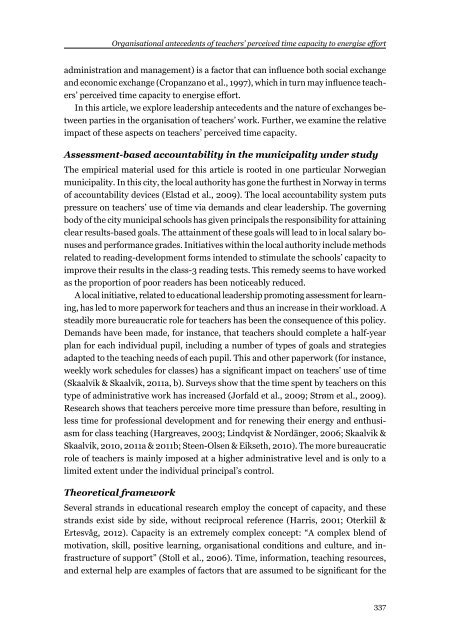Download issue - Umeå universitet
Download issue - Umeå universitet
Download issue - Umeå universitet
You also want an ePaper? Increase the reach of your titles
YUMPU automatically turns print PDFs into web optimized ePapers that Google loves.
Organisational antecedents of teachers’ perceived time capacity to energise effort<br />
administration and management) is a factor that can influence both social exchange<br />
and economic exchange (Cropanzano et al., 1997), which in turn may influence teachers’<br />
perceived time capacity to energise effort.<br />
In this article, we explore leadership antecedents and the nature of exchanges between<br />
parties in the organisation of teachers’ work. Further, we examine the relative<br />
impact of these aspects on teachers’ perceived time capacity.<br />
Assessment-based accountability in the municipality under study<br />
The empirical material used for this article is rooted in one particular Norwegian<br />
municipality. In this city, the local authority has gone the furthest in Norway in terms<br />
of accountability devices (Elstad et al., 2009). The local accountability system puts<br />
pressure on teachers’ use of time via demands and clear leadership. The governing<br />
body of the city municipal schools has given principals the responsibility for attaining<br />
clear results-based goals. The attainment of these goals will lead to in local salary bonuses<br />
and performance grades. Initiatives within the local authority include methods<br />
related to reading-development forms intended to stimulate the schools’ capacity to<br />
improve their results in the class-3 reading tests. This remedy seems to have worked<br />
as the proportion of poor readers has been noticeably reduced.<br />
A local initiative, related to educational leadership promoting assessment for learning,<br />
has led to more paperwork for teachers and thus an increase in their workload. A<br />
steadily more bureaucratic role for teachers has been the consequence of this policy.<br />
Demands have been made, for instance, that teachers should complete a half-year<br />
plan for each individual pupil, including a number of types of goals and strategies<br />
adapted to the teaching needs of each pupil. This and other paperwork (for instance,<br />
weekly work schedules for classes) has a significant impact on teachers’ use of time<br />
(Skaalvik & Skaalvik, 2011a, b). Surveys show that the time spent by teachers on this<br />
type of administrative work has increased (Jorfald et al., 2009; Strøm et al., 2009).<br />
Research shows that teachers perceive more time pressure than before, resulting in<br />
less time for professional development and for renewing their energy and enthusiasm<br />
for class teaching (Hargreaves, 2003; Lindqvist & Nordänger, 2006; Skaalvik &<br />
Skaalvik, 2010, 2011a & 2011b; Steen-Olsen & Eikseth, 2010). The more bureaucratic<br />
role of teachers is mainly imposed at a higher administrative level and is only to a<br />
limited extent under the individual principal’s control.<br />
Theoretical framework<br />
Several strands in educational research employ the concept of capacity, and these<br />
strands exist side by side, without reciprocal reference (Harris, 2001; Oterkiil &<br />
Ertesvåg, 2012). Capacity is an extremely complex concept: “A complex blend of<br />
motivation, skill, positive learning, organisational conditions and culture, and infrastructure<br />
of support” (Stoll et al., 2006). Time, information, teaching resources,<br />
and external help are examples of factors that are assumed to be significant for the<br />
337

















